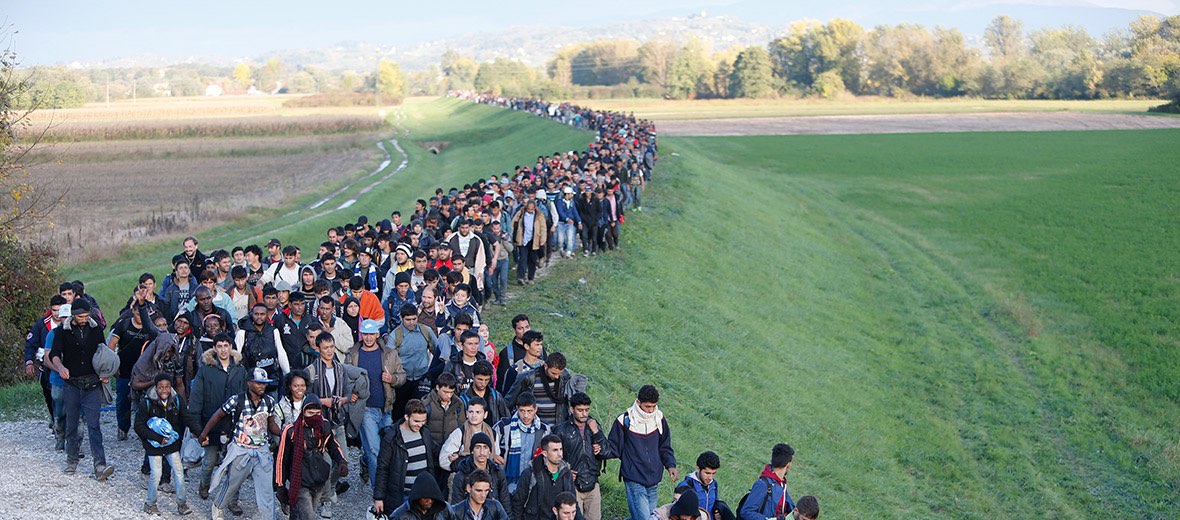Human Migration
Human migration is a major issue that the MEFE AIS4M technical paradigm will attempt to solve. Human Migration connotes the act of individuals relocating, either temporarily or permanently, from one location to another. Human migration is driven by poor living conditions, including government corruption, violence, and economic instability. The MEFE AI-based technological model encompasses the solutions to the issues that cause human migration, advocating and promising transparency, clarity, and integrity, along with honesty in its functioning, while delivering services locally to each individual via digital tablets in close cooperation with national governments, NGOs and private sector companies through Public-Private Partnerships (PPPs) utilizing digital platforms and ecosystems. Policy Recommendations USA – Immigration: Building a System for Tomorrow | Immigration
Furthermore, it addresses the issue of unemployment. By enabling individuals to take on freelance employment based on their IT credentials and training, thereby making provision for earning remotely. Individuals will be able to participate in the global economy and compete on a global scale with local or national job issues. As a result, the strain on local, regional, and federal governments to provide jobs is reduced, consequently improving lifestyles and living conditions, increasing access to healthcare, and, as a result, generating income. Key Facts about US Immigration Policies
In 2020, 281 million people, which constitutes 3.6% of the world’s population, were registered as migrants. Over the past 50 years, there has been as increase in the expected number of international migrants. The migrants may be generally classified as legal, or illegal, or refugees/asylum seekers. World Migration Report 2022
The UNHCR reported 26.4 million refugees and 82.4 million people who had been forcibly relocated around the world in 2020. 10.7 million Americans, or 3.3% of the overall population, are undocumented, according to statistics on illegal immigration. Similar to Germany, which is home to 1.1 to 1.4 million illegal migrants, whereas Russia is projected to have 10 to 12 million illegal immigrants. While the situation in other nations appears no different. Therefore, the rising issue of human migration entails a detailed discussion of the causes and effects of migration. The climate crisis, migration and refugees

Migration Data Portal – The bigger picture
Who migrates?
1. People who have experienced poverty in their own country
2. Individuals who are unable to obtain employment in their country of origin
3. Individuals who desire to flee their own nations due to civil wars, conflicts and bloodshed
4. People seeking to flee racial, religious, or national identity persecution that has occurred or will occur
5. Those seeking refuge from natural calamities, including earthquakes, storms, floods, and droughts
6. Illiterate individuals who aspire to seek education
7. People who migrate for family reunification when they cannot find a family visa legally
8. People who want to escape governance issues in their home countries
Why do people migrate?
1. In order to flee political repression or conflict (Political migration)
2. In order to avoid droughts, floods, agricultural failures, etc (Environmental migration)
3. For pursuing more rewarding occupations (economic migration)
4. For having better quality of life (social migration)
5. To be closer to family or friends (social migration)
Where do people migrate?
Mostly migrants move to those countries that have good political and economic institutions, and sound social security system, e.g. United States, Germany, Italy etc., and where they can find the following things:
1. Steady provision of basic necessities (in case of illegal migration)
2. Higher wages
3. Better employment opportunities
4. Higher standard of living
5. Educational opportunities
When do people migrate?
Migration is theoretically viewed as an investment in human capital. People only migrate if the returns on their human capital are higher in the country of destination than to the country of origin. Therefore, the majority of migrants are either young or persons of working age. A study by the Institute of Development Studies found that:
1. International migrants were, on average, 39 years old.
2. The majority of migrants are between the ages of 20 and 64, or working age.
3. The number under 20 years was 37 million globally.
How do people migrate?
1. By Sea (most of the illegal migrants travel through boats)
2. By Land (Illegal migrants do travel by land enclosed in containers)
3. By air
OUT OF MANY ONE, PORTRAITS OF AMERICA’S IMMIGRANTS by George W. Bush
UN Migration | Global Compact for Migration | International Migration Management in the age of Artificial Intelligence
Migration Made Easy with the help of Machine Learning | $4 Billion to stop Central American Immigration | Immigration Quotes from Great Americans

“We the people of this continent are not afraid of foreigners because many of us were once foreigners.” Pope Francis
“If we ever closed the door to new Americans, our leadership in the world would soon be lost.” Ronald Reagan
“It says something about our country that people around the world are willing to leave their homes and leave their families and risk everything to come to America. Their talent and hard work and love of freedom have helped make America the leader of the world. And our generation will ensure that America remains a beacon of liberty and the most hope fill society this world has ever known.” George H. W. Bush
“[Let] the poor the needy and oppressed of the Earth, and those who want Land, resort to the fertile lands of our western country, the second land of Promise, and there dwell in peace, fulfilling the first and great commandment.” George Washington
“Born in other countries, yet believing you could be happy in this, our laws acknowledge, as they should do, your right to join us in society, conforming, as I doubt not you will do, to our established rules. That these rules shall be as equal as prudential considerations will admit, will certainly be the aim of our legislatures, general and particular.” Thomas Jefferson